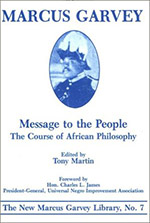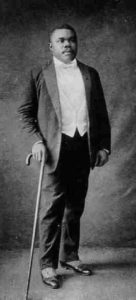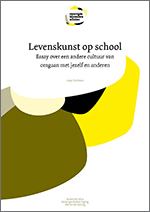 Marcus Garvey schreef een paar jaar voor zijn overlijden het boek ‘Message to the people’, in 1937. Garvey had zijn leven lang gestreden voor het zelfrespect en vereniging van Afrikanen inclusief de Afro-Amerikanen en bijvoorbeeld Jamaicanen zoals hijzelf. Hij richtte de invloedrijke Universal Negro Improvement Association (UNIA) op. Miljoenen mensen wist hij achter zijn filosofie van bevrijding te scharen: bevrijding van slavernij, racisme, onderdrukking, economische uitbuiting, en overheersing. “His newspaper, Negro World, told of the exploits of heroes of the race and of the splendours of African culture. He taught that blacks would be respected only when they were economically strong, and he preached an independent black economy within the framework of white capitalism. To forward these ends, he established the Negro Factories Corporation and the Black Star Line (1919), as well as a chain of restaurants and grocery stores, laundries, a hotel, and a printing press.” (Brittanica)
Marcus Garvey schreef een paar jaar voor zijn overlijden het boek ‘Message to the people’, in 1937. Garvey had zijn leven lang gestreden voor het zelfrespect en vereniging van Afrikanen inclusief de Afro-Amerikanen en bijvoorbeeld Jamaicanen zoals hijzelf. Hij richtte de invloedrijke Universal Negro Improvement Association (UNIA) op. Miljoenen mensen wist hij achter zijn filosofie van bevrijding te scharen: bevrijding van slavernij, racisme, onderdrukking, economische uitbuiting, en overheersing. “His newspaper, Negro World, told of the exploits of heroes of the race and of the splendours of African culture. He taught that blacks would be respected only when they were economically strong, and he preached an independent black economy within the framework of white capitalism. To forward these ends, he established the Negro Factories Corporation and the Black Star Line (1919), as well as a chain of restaurants and grocery stores, laundries, a hotel, and a printing press.” (Brittanica)
Dekolonisatie stond centraal in Garveys werk en leven, als centraal idee binnen voor die bevrijding. Zelf was Garvey geboren op Jamaica wat tot 1958 nog een kolonie geweest van het Britse rijk. Ook Nederland had tot aan het eind van de tweede wereld oorlog natuurlijk nog talrijke kolonies, de Nederlandse Antillen en Suriname zelfs nog tot 1954. Garvey was een voorbeeld voor veel van de latere betogers voor onafhankelijkheid van de koloniën. In diverse latere vrijheidsbewegingen werd zijn werk geroemd.
 Voor Garvey kon onderwijs niet los worden gezien van kolonialisme. Het onderwijs ten tijde van kolonisatie staat altijd in dienst van de kolonisator: dus in dienst van de blanke overheersers. Onderwijs ziet Garvey dan ook als concreet onderdeel van het onderdrukkende koloniale en racistische systeem. Het onderwijs is in handen van het ‘establishment’ en daarmee toont het die normen en waarden: het dient een minderheid, namelijk de minderheid die het voor het zeggen heeft. Onderwijs maakt je slaaf van het systeem, dienstbaar aan die minderheid. Een ‘re-educatie’ is nodig voor de onderdrukte meerderheid om niet slaaf te worden van het systeem.
Voor Garvey kon onderwijs niet los worden gezien van kolonialisme. Het onderwijs ten tijde van kolonisatie staat altijd in dienst van de kolonisator: dus in dienst van de blanke overheersers. Onderwijs ziet Garvey dan ook als concreet onderdeel van het onderdrukkende koloniale en racistische systeem. Het onderwijs is in handen van het ‘establishment’ en daarmee toont het die normen en waarden: het dient een minderheid, namelijk de minderheid die het voor het zeggen heeft. Onderwijs maakt je slaaf van het systeem, dienstbaar aan die minderheid. Een ‘re-educatie’ is nodig voor de onderdrukte meerderheid om niet slaaf te worden van het systeem.
Een lang citaat uit het boek geeft zijn visie goed weer.
The present system of education is calculated to subjugate the majority and elevate the minority. The system was devised and has been promulgated by agents of the minority. This system was carefully thought out by those who desire to control others for their benefit and to the disadvantage of the others; to the extent that the others would not immediately rise into happiness and enjoyment of life simultaneously and equally with them. It was never originally intended to make all the people equal at the same time. Even more so, was it not intended to elevate the darker races to the immediate standard of the white races. The minority sprung from the white race to establish the system of education. Therefore, all textbooks and general literature are colored to suit the particular interest of those who established the system of education, and the group they represent as against the interest of others whom they did not want to immediately elevate to their standard.
There is always a limited process in the education of other races by the race that originates the system of education. As for instance, if a Negro attends a university with other students of the race that originated or projects the educational system, while the Negro would have the privilege of the classroom for general instructions to learn commonly, he may not have the privilege of his fellow students of the other race, who may be admitted to cer tain club fraternities within the university from which he would be debarred. Such fraternities generally enjoy the privilege of special instructions and special discussions which convey a wider range of enlightenment on the subjects taught than would be possible to the Negro, hence, when he graduates even from the same textbooks his technical knowledge is not as wide as that of others who have had fuller explanation in the technical interpretation of the particular textbooks and at the same time is only trained to reflect the system that props the intentions of the creators of the system, so that at his best, he who is making use of his education, is a slave to a system that was not intended for him, but to which he renders service.
Therefore, it is necessary for the Negro to be additionally educated or re-educated after he has imbibed the present system of education. The best way to do this is to educate him racially in the home, meeting hall or his own club, where he will be put under the closest scrutiny and analysis of what appears to be education, as coming from other people, because their system of education may not completely fit into the Negro’s ideas of his own preservation.
De situatie die Garvey omschrijft is niet gelijk aan het hedendaagse onderwijsbestel. Maar toch: kolonialisme is geenszins verdwenen, de exploitatie van vroegere koloniën gaat in veel gevallen, zoals met name Nkrumah schreef (direct geïnspireerd door Garvey), bijvoorbeeld in meer indirecte en verhulde vormen van overheersing en nieuwe uitwassen van imperialisme. In dat verband wordt ook wel gesproken van neokolonialisme, waarbij de samenhang met het kapitalisme, racisme, en ook met culturele dominantie (van een specifieke welgestelde groep) wordt benadrukt. Het kolonialisme gaat in die zin onverminderd voort, zo wordt betoogd, ook al zijn de koloniën formeel afgeschaft. En inderdaad kan zoiets makkelijk worden volgehouden als je kijkt naar de door de overheid bepaalde eindtermen of naar welke bevolkingsgroep het meest succesvol is binnen het huidige onderwijssysteem. Waarschijnlijk dient elke onderwijsfilosofie expliciet rekenschap te geven van het koloniale verleden, om te beseffen dat onderwijs inderdaad daardoor nog altijd ‘ongemerkt’ racistisch, onderdrukkend en cultureel overheersend is.
“Garvey zag dat “ras” en racisme niet toevallige of bijkomstige aspecten zijn van het kapitalisme. Het is basis van een wereldsysteem dat met het Westers kolonialisme in het leven is geroepen sinds 1492. Dit systeem had niet alleen een economische dimensie (uitbuiting), maar ook een politieke (onderdrukking en onderwerping), een sociale (de organisatie van sociale relaties langs lijnen van ras en etniciteit) en een culturele (mental slavery).” Het werk van Garvey is onverminderd relevant en inspirerend voor iedereen die zich bezig wil houden met de dekolonisatie van onderwijs. Zeker ook omdat hij, in dit boek met name, alledaagse tips en uitganspunten formuleert om een dergelijke dekolonisatie vorm te geven en om te gaan met de onderdrukkende werking van het onderwijssysteem.
Een belangrijk middel volgens Garvey is het lezen van boeken. Boeken die de mensen bewust maakt en hen kritisch laat reflecteren op alles wat hen beteugelt. Lang niet alle boeken op de website onderwijsfilosofie.nl zullen die toetssteen doorstaan, maar de belangrijkste die dit wel doen zijn te vinden via de categorie ‘dekolonisatie‘.




